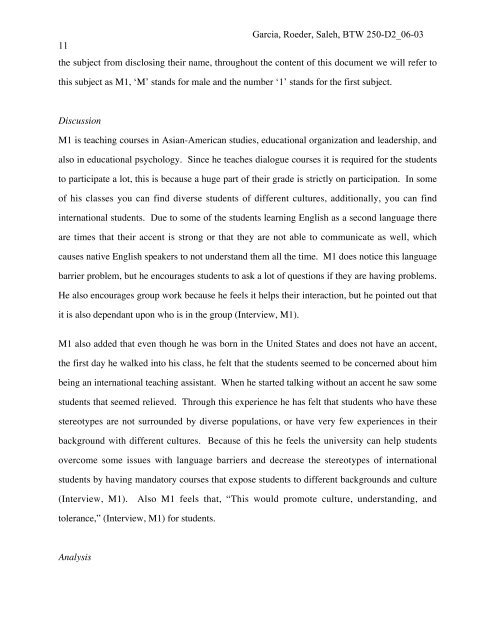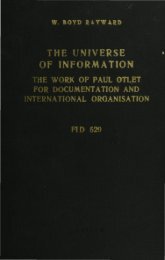Language Barriers in the University of Illinois Urbana ... - ideals
Language Barriers in the University of Illinois Urbana ... - ideals
Language Barriers in the University of Illinois Urbana ... - ideals
You also want an ePaper? Increase the reach of your titles
YUMPU automatically turns print PDFs into web optimized ePapers that Google loves.
Garcia, Roeder, Saleh, BTW 250-D2_06-03<br />
11<br />
<strong>the</strong> subject from disclos<strong>in</strong>g <strong>the</strong>ir name, throughout <strong>the</strong> content <strong>of</strong> this document we will refer to<br />
this subject as M1, ‘M’ stands for male and <strong>the</strong> number ‘1’ stands for <strong>the</strong> first subject.<br />
Discussion<br />
M1 is teach<strong>in</strong>g courses <strong>in</strong> Asian-American studies, educational organization and leadership, and<br />
also <strong>in</strong> educational psychology. S<strong>in</strong>ce he teaches dialogue courses it is required for <strong>the</strong> students<br />
to participate a lot, this is because a huge part <strong>of</strong> <strong>the</strong>ir grade is strictly on participation. In some<br />
<strong>of</strong> his classes you can f<strong>in</strong>d diverse students <strong>of</strong> different cultures, additionally, you can f<strong>in</strong>d<br />
<strong>in</strong>ternational students. Due to some <strong>of</strong> <strong>the</strong> students learn<strong>in</strong>g English as a second language <strong>the</strong>re<br />
are times that <strong>the</strong>ir accent is strong or that <strong>the</strong>y are not able to communicate as well, which<br />
causes native English speakers to not understand <strong>the</strong>m all <strong>the</strong> time. M1 does notice this language<br />
barrier problem, but he encourages students to ask a lot <strong>of</strong> questions if <strong>the</strong>y are hav<strong>in</strong>g problems.<br />
He also encourages group work because he feels it helps <strong>the</strong>ir <strong>in</strong>teraction, but he po<strong>in</strong>ted out that<br />
it is also dependant upon who is <strong>in</strong> <strong>the</strong> group (Interview, M1).<br />
M1 also added that even though he was born <strong>in</strong> <strong>the</strong> United States and does not have an accent,<br />
<strong>the</strong> first day he walked <strong>in</strong>to his class, he felt that <strong>the</strong> students seemed to be concerned about him<br />
be<strong>in</strong>g an <strong>in</strong>ternational teach<strong>in</strong>g assistant. When he started talk<strong>in</strong>g without an accent he saw some<br />
students that seemed relieved. Through this experience he has felt that students who have <strong>the</strong>se<br />
stereotypes are not surrounded by diverse populations, or have very few experiences <strong>in</strong> <strong>the</strong>ir<br />
background with different cultures. Because <strong>of</strong> this he feels <strong>the</strong> university can help students<br />
overcome some issues with language barriers and decrease <strong>the</strong> stereotypes <strong>of</strong> <strong>in</strong>ternational<br />
students by hav<strong>in</strong>g mandatory courses that expose students to different backgrounds and culture<br />
(Interview, M1). Also M1 feels that, “This would promote culture, understand<strong>in</strong>g, and<br />
tolerance,” (Interview, M1) for students.<br />
Analysis
















